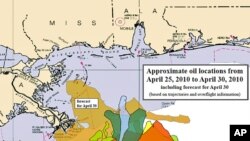Bad weather is hampering clean-up efforts in the Gulf of Mexico, where emergency crews are struggling to cap an undersea oil leak. U.S. officials are pressing British Petroleum to do more to respond to the disaster.
Strong winds and high tides are complicating the work of emergency crews that have fanned out across the Gulf of Mexico in response to the oil spill. U.S. officials say the leak is dumping 5,000 barrels of oil a day into the gulf, feeding a massive slick on the surface of the water.
Emergency crews are using a number of methods to stop the spread of oil, such as laying containment boom, burning small pools of oil, and spreading chemicals to disperse the oil.
But Doug Suttles, chief operating officer of British Petroleum which is responsible for the spill, says many of those methods are only possible during good weather. "But when the winds and the seas come up, unfortunately we can't do much on the surface of the sea. As a I stand here today, because of wave height, we are unable to skim. We are able to place dispersant," he said.
Suttles says the company is doing everything possible to stop the undersea leak, and says it has reached out to everyone in the oil industry for assistance.
U.S. officials, however, are pressing the company to do more, as the potential for economic and environmental damage looms larger.
Louisiana Governor Bobby Jindal says British Petroleum, or BP, is ultimately responsible for the leak. "We are concerned and we have encouraged BP strongly to seek even more assistance from the federal government. I do think this response could overwhelm their capabilities, not just for Louisiana, but other states that may be impacted," he said.
High winds also are responsible for pushing the oil slick into the Mississippi River delta region of Louisiana, which poses a threat to wildlife and commercial fishing operations.
Already, wildlife officials have begun closing off parts of the gulf to commercial fishermen, who were set to begin the annual fishing season. Fishermen fear they oil spill will ruin the entire season across a wide swath of the gulf, and destroy their businesses.
Janet Napolitano, head of the Department of Homeland Security, says coastal residents stand to lose the most. "Those who have the most effective stakes are the men and women who live in the coastal areas of Louisiana, Mississippi, Alabama and Florida. They are utmost in our minds," she said.
Environmental officials say they are to begin water quality tests on Saturday along affected coastal areas. They already have started testing the air, as residents of southeastern Louisiana are complaining of an odor possibly coming from the slick.
Lisa Jackson, the head of the Environmental Protection Agency, says experts know high winds are lifting particles of oil from the slick and carrying them into the air. "The question is what does that mean? We don't have any reason to believe there is a concern, but we can't answer that until we get the data. That data collection has already begun," she said.
U.S. officials have ordered an inspection of oil rigs in the gulf to ensure that a similar disaster does not happen again. The current leak should have been prevented by a massive valve at the base of the oil rig, which is designed to close in case of emergency. The oil company and U.S. officials hope to recover the device and investigate why it failed to operate correctly.




